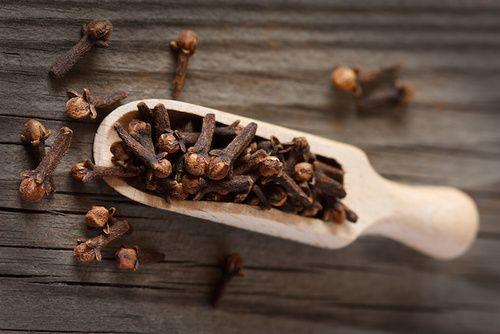I Cloves they are obtained from the dried bud of the Eugenia caryophyllata plant. From action digestive, invigorating and antiseptic, they are useful against headaches, toothache and exhaustion. Let's find out better.
> Properties and benefits of cloves
> Calories and nutritional values of cloves

Description of the plant
Although the name may be misleading, i cloves they are called so only because the spice takes on an aspect reminiscent of carnation. In reality this drug, widespread in the East and arrived in the West in the XNUMXth century, is the dried bud of Eugenia caryophyllata, an evergreen tree that belongs to the Myrtaceae family.
Not to be confused with allspice, also called clove pepper.
The composition of cloves is characterized by the predominance of a propenylphenol: theeugenol. It represents up to80% of the essential oil and it is precisely this component that gives the spice the particular aromas and fragrances that have made it the protagonist not only of kitchens but also of perfumes and balsamic oils. Eugenol also has antiseptic and anesthetic powers.
In cloves there are also fair amounts of beta cariofillene, a natural anti-inflammatory.
Properties and benefits of cloves
Cloves have local anesthetic and analgesic properties, for this reason they were used in the past as a natural remedy for toothache and still today they are present in the composition of many oral disinfectants.
They stimulate the blood circulation, help to win the exhaustion, headache and memory loss, I am digestive e toningthe. Furthermore, it would seem that cloves are among the foods with aphrodisiac properties.
Sienese doctors of the 500th century wrote that cloves, cooked in a cup of milk, stimulate the “forces of Venus” and that “they help the defects of the stomach, liver, heart and head” and “corroborate coitus”.
Another virtue of this precious spice is that of being a powerful natural antioxidant: fights the action of free radicals keeping the body young.
Calories and nutritional values of cloves
100 g of cloves contain 274 kcal, e:
- 5,97 g protein
- G carbohydrates 65,53
- Sugars 2,38 g
- 13 g fat
- Cholesterol 0 mg
- Dietary fiber 33,9 g
- Sodium 277 mg
Cloves among the remedies for toothache: discover the others

Use in the kitchen
Cloves are very popular in sweet recipes as in savory ones.
They are used to flavor sweets, cooked fruit, gingerbreads, biscuits, creams, liqueurs and flavored wines (e.g. mulled wine).
They accompany meat very well: they are added to soups or soups with meat, they are used in stews, with game and to enrich barbecue sauces. They flavor aged cheeses, some sweet vegetables such as onions and carrots and pickled vegetables.
With this pungent and fragrant spice teas and infusions are often flavored. Cloves they are very aromatic: to give a spicy tone to a dish without covering its flavor, one will suffice.
Curiosities about cloves
Il particular scent of cloves, so intense and pungent and slightly fruity, has made them an ingredient in many perfumes and their essential oil is widely used in the cosmetic industry.
In Indonesia it is used to produce aromatic cigarettes, with a very particular flavor.
Put a handful of cloves in a small bag in the closet (you can add some cinnamon) is useful for keep moths away, as well as putting them in a small bowl in the pantry will keep the food butterflies away.
READ MORE
The properties and contraindications of clove essential oil
Other articles on cloves:
> Natural toothpaste with cloves


























